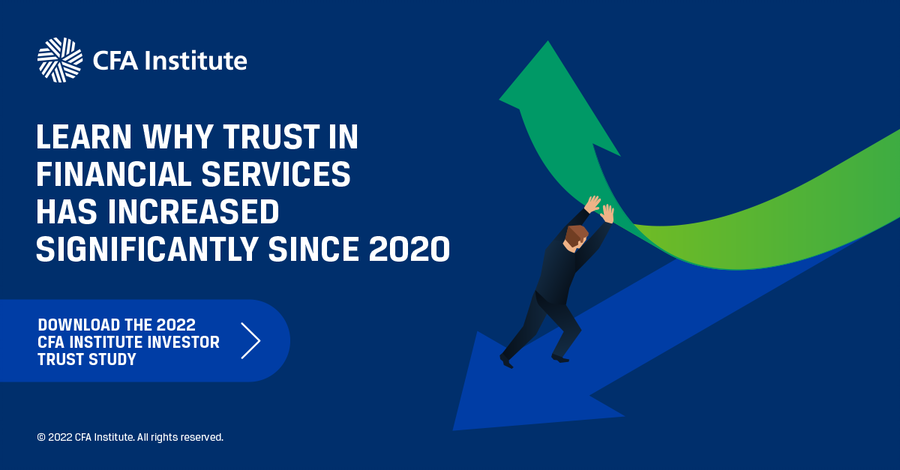
Wealth Managers and the Future of Trust: Insights from CFA Institute’s 2022 Investor Trust Study
Corporate responsibility is more important than ever. Today, many investors expect more than just profit from their financial decisions; they want easy access to financial products and to be able to express personal values through their investments. Crucial to meeting these new investor expectations is trust in the financial services providers that enable investors to build wealth and realise personal goals. Trust is the bedrock of client relationships and investor confidence.
The 2022 CFA Institute Investor Trust Study – the fifth in a biennial series – found that trust levels in financial services among retail and institutional investors have reached an all-time high. Reflecting the views of 3,588 retail investors and 976 institutional investors across 15 markets globally, the report is a barometer of sentiment and an encouraging indicator of the trust gains in financial services.
Wealth managers may want to know how this trust can be cultivated, and how they can enhance it within their own organisations. I outline three key trends that will shape the future of client trust.
The rise of ESG
ESG metrics have risen to prominence in recent years, as investors increasingly look at environmental, social and governance factors when assessing risks and opportunities. These metrics have an impact on investor confidence and their propensity to invest; we find that among retail investors, 31% expect ESG investing to result in higher risk-adjusted returns, while 44% are primarily motivated to invest in ESG strategies because they want to express personal values or invest in companies that have a positive impact on society or the environment.
The Trust Study shows us that ESG is stimulating confidence more broadly. Of those surveyed, 78% of institutional investors said the growth of ESG strategies had improved their trust in financial services. 100% of this group expressed an interest in ESG investing strategies, as did 77% of retail investors.
There are also different priorities within ESG strategies, and our study found a clear divide between which issues were top of mind for retail investors compared to institutional investors. Retail investors were more focused on investments that tackled climate change and clean energy use, while institutional investors placed a greater focus on data protection and privacy, and sustainable supply chain management.
What is clear is that the rise of ESG investing is building trust and creating opportunities for new products.
Technology multiplies trust
Technology has the power to democratise finance. In financial services, technological developments have lowered costs and increased access to markets, thereby levelling the playing field. Allowing easy monitoring of investments, digital platforms and apps are empowering more people than ever to engage in investing. For wealth managers, these digital advancements mean an opportunity for improved connection and communication with investors, a strategy that also enhances trust.
The study shows us that the benefits of technology are being felt, with 50% of retail investors and 87% of institutional investors expressing that increased use of technology increases trust in their financial advisers and asset managers, respectively. Technology is also leading to enhanced transparency, with the majority of retail and institutional investors believing that their adviser or investment firms are very transparent.
It’s worth acknowledging here that a taste for technology-based investing varies across age groups. More than 70% of millennials expressed a preference for technology tools to help navigate their investment strategy over a human advisor. Of the over-65s surveyed, however, just 30% expressed the same choice.
The pull of personalisation
How does an investor’s personal connection to their investments manifest? There are two primary ways. The first is to have an adviser who understands you personally, the second is to have investments that achieve your personal objectives and resonate with what you value.
Among retail investors surveyed for the study, 78% expressed a desire for personalised products or services to help them meet their investing needs. Of these, 68% said they’d pay higher fees for this service.
So, what does personalisation actually look like? The study identifies the top three products of interest among retail investors. They are: direct indexing (investment indexes that are tailored to specific needs); impact funds (those that allow investors to pursue strategies designed to achieve specific real-world outcomes); and personalised research (customised for each investor).
When it comes to this last product, it’s worth noting that choosing advisors with shared values is also becoming more significant. Three-quarters of respondents to the survey said having an adviser that shares one’s values is at least somewhat important to them. Another way a personal connection with clients can be established is through a strong brand, and the proportion of retail investors favouring a brand they can trust over individuals they can count on continues to grow; it reached 55% in the 2022 survey, up from 51% in 2020 and 33% in 2016.
Trust in the future
As the pressure on corporations to demonstrate their trustworthiness increases, investors will also look to financial services to bolster trust. Wealth managers that embrace ESG issues and preferences, enhanced technology tools, and personalisation, can demonstrate their value and build durable client relationships over market cycles.
To access the full report click here.

Article originally published in Finance Derivative.
Image credit: ©Getty Images/Rob Daly